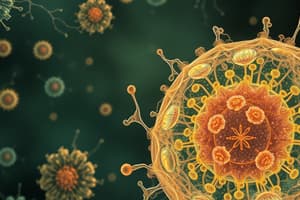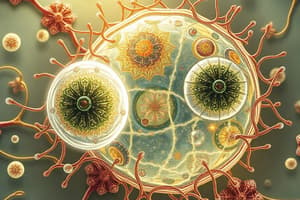Podcast
Questions and Answers
Who coined the term 'cells'?
Who coined the term 'cells'?
Robert Hooke
What did Antonie van Leeuwenhoek discover?
What did Antonie van Leeuwenhoek discover?
Living microscopic single-cell organisms
Mathias Schleiden and Theodor Schwann proposed that all plants and animals are made up of _____.
Mathias Schleiden and Theodor Schwann proposed that all plants and animals are made up of _____.
cells
Rudolf Virchow concluded that new cells can arise spontaneously.
Rudolf Virchow concluded that new cells can arise spontaneously.
Which of the following is NOT a principle of the cell theory?
Which of the following is NOT a principle of the cell theory?
Match the following functions of life with their descriptions:
Match the following functions of life with their descriptions:
What are the two major types of cells?
What are the two major types of cells?
Prokaryotic cells lack a _____
Prokaryotic cells lack a _____
What is the purpose of organelles?
What is the purpose of organelles?
Eukaryotic cells contain a nucleus.
Eukaryotic cells contain a nucleus.
Flashcards
Cell Theory
Cell Theory
The fundamental theory in biology stating that all living things are composed of cells, the cell is the smallest unit of life, and cells arise from pre-existing cells.
Robert Hooke
Robert Hooke
Englishman who first used the term 'cells' in 1665, describing what he observed in cork under a compound microscope.
Antonie van Leeuwenhoek
Antonie van Leeuwenhoek
Dutchman who discovered living single-celled organisms in 1675, founding microbiology.
Prokaryotic cell
Prokaryotic cell
Signup and view all the flashcards
Eukaryotic cell
Eukaryotic cell
Signup and view all the flashcards
Organelle
Organelle
Signup and view all the flashcards
Microscope
Microscope
Signup and view all the flashcards
Rudolf Virchow
Rudolf Virchow
Signup and view all the flashcards
Cell
Cell
Signup and view all the flashcards
Mathias Schleiden and Theodor Schwann
Mathias Schleiden and Theodor Schwann
Signup and view all the flashcards




